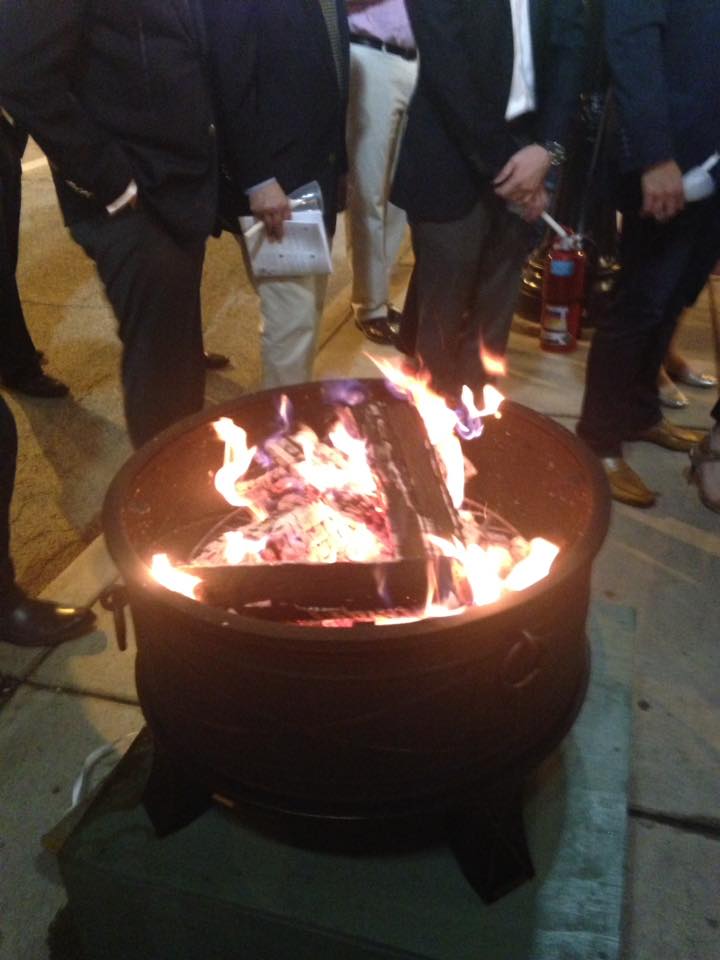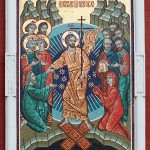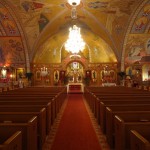
I’ve made no secret that I attended the Easter Vigil at a Latin parish in Chicago instead of going to a Byzantine temple for Pascha. There were many reasons for this, and I also realize that I could have gone to Pascha afterward anyway, but I was far too tired from the conferences from my secular professional life – indeed, I slept for twelve hours afterward. That said, I feel that I have been carried on the prayers on the Kyivan Church as my impulse is still to sing the Paschal tropar in a Galician tone as well as the exapostilarion, the irmos, and parts of the canon. Pascha encompasses my entire Christian existence as my body is formed in Christ through the Greek-Catholic Church of Kyiv.
The real reason I went to Old St Pat’s in lieu of an Orthodox Pascha was because my friend was getting chrismated. There is a special bond among us Chinese evangelicals who come into the apostolic churches, and together with some of her friends (most of whom were still evangelical), we celebrated her entry into the Catholic Church and then had a vigorous debate over late night Chinese food in Chinatown about what this entry meant about her relationship with evangelical Protestants now.
Many of the practices of the Latin Church are not natural for someone whose body is being formed in the Kyivan Church. For one, Latins don’t ‘reverence’ (sign of the cross, right to left, with a bow) whenever they feel inwardly moved, but as I was moved at several point in the service, this is exactly what I did, and I think together with me being woefully underdressed for the service (I had gotten back from the conference and was in the mood for relaxation), that garnered more than one awkward stare. The eighth article of the Union of Brest, by which our church came into communion with Rome in 1598, actually articulates more of the differences between Easter and Pascha:
Likewise that we should not be compelled to have the blessing of fire, the use of wooden clappers, and similar ceremonies before Easter, for we have not had such ceremonies in our Church until now, but that we should maintain our ceremonies according to the rubrics and the Typicon of our Church.
I therefore understand the service that I attended on Pascha to be fundamentally different from my own tradition, yet in a church with which I am in full communion. The same goes for my friend and all those who were received together with her by baptism and chrismation into the Latin Church that night; they joined my sister church, a fundamentally different autonomous church from mine, and yet because of our full communion, I fully celebrate that my sister became Catholic and now shares in the drama of our conjoined ecclesial houses. Full communion means that I was completely aware of two simultaneous realities: that I was celebrating Pascha in an ecclesial house that is not my own, but this ecclesial house – quite unlike the Protestants with whom I have been drawing distinctions throughout the Great Fast – is so deeply linked with mine that it can be said still that we are one family at the same table.
The first sense I got, then, was that our joined ecclesial houses had gotten larger. As the catechumens were dunked and then the catechumens and candidates held candles while being chrismated, I felt viscerally that not only my friend, but also these people I did not know personally were now part of my family.
But the second sense was much more interesting. One of the interesting things about this particular parish, Old St Pat’s, is that there seems to be some attempt to claim a kind of Celtic spirituality as an old Irish Catholic parish named after St Patrick, Enlightener of the Irish. Modern British colonization be damned, however (except to say that it ruins everything I want to say!), the feeling that I got from the various attempts to subtly and not-so-subtly reclaim this heritage – Celtic crosses, an emphasis on the fire of love, the praying of the Breastplate of St Patrick – reminded me of the Anglicanism from which I came, an Anglicanism steeped not so much in the English Reformation but predating it all from Bede’s Ecclesiastical History to the fourteenth-century mystics like Richard Rolle, Julian of Norwich, Margery Kempe, Walter Hilton, and the mysterious author of The Cloud of Unknowing.
Now of course, to be very clear, I recognize that such a take will be as offensive to my Irish readers as my Ukrainian sisters and brothers would take umbrage to a writer lumping them in as Russian. I must clarify that what I have in mind here is a decolonized, fully Catholic sense of the ecclesia Anglicanorum that I failed to develop on my blog when I was an Anglican and that is much too complex to discuss here, except to say that I feel this objection in my gut and will perhaps have something to say about it some other time. I promise to use James Joyce to explain this when I get around to it, as well as to discuss how Irish Catholics and Protestants have both been formative to my spiritual life.
To do even more hand-waving, what I mean by ‘Anglican’ is thus not the same thing as when Catholics refer to ‘Anglicanism’ as a kind of liberal loosey-gooseyness that they are afraid is infecting the Vatican. When I blogged for Logos Anglican, I argued from the earliest sources to the present that the Anglican charism is a ‘public mysticism,’ a democratization of the Sarum Rite’s private priestly prayer: Almighty God, unto whom all hearts are open, all desires known, and from whom no secrets are hid, cleanse the thoughts of our hearts by the inspiration of Thy Holy Spirit, that we may perfectly love Thee, and worthily magnify Thy holy Name, through Christ our Lord, amen. What I did not get to fully develop while writing both there and as Chinglican was the implication of such a spirituality: it means that through the fire of the Holy Spirit, Anglicans pursue a way of perfection that can only be characterized by exorcism; it is no exaggeration to say, for example, that when Holy Augustine of Canterbury arrives in the British Isles sent by the Holy Pope Gregory the Great, he and his successors achieve an exorcism of the spirits of tribal warfare from the island by converting the tribal chieftains – is this not what Holy Patrick also did for the Irish? It was in this light also that when I first heard the current Archbishop of Canterbury Justin Welby open his first press conference with the Franciscan prayer Come, Holy Spirit, fill the hearts of your faithful and kindle in them the fire of your love, I nearly fell off my chair as I recognized that emphasis on fiery exorcism as the hallmark of the Anglican charism.
At a purely experiential level – meaning that it is very unlikely that this is how Old St Pat’s liturgists meant for me to take it – the Easter Vigil’s emphasis on fire and exorcism, paired with the Breastplate of St Patrick, evoked in me a pathway to G-d that I thought I had abandoned when I joined the Kyivan Church: the white-hot fire of exorcizing purification from the demons of tribalism that lead to incessant warfare. To be sure, when I was pursuing my catechumenate, I had been told not to abandon this charismatic Anglican sensibility, to come into an even fuller appreciation of the Book of Common Prayer and its Sarum Rite origins by participating in the Fellowship of St Alban and St Sergius, to perhaps attend the occasional Choral Evensong, to seek out the Personal Ordinariate where possible (indeed, the bishop is an alumnus of my high school in Hayward), to never speak ill of my Anglican sisters and brothers, as frustrated as I was with Communion politics. But the fact was that in my overreaction, I had not so much consciously abandoned these sensibilities as I had simply forgotten about them in my zeal to become fully Kyivan: I had forgotten my devotion to Julian of Norwich, I had forgotten about Holy Patrick Enlightener of the Irish, I had forgotten Holy Bede the Venerable and the story of Cædmon who was given the songs of heaven and earth, I had forgotten about the fiery exorcism of the spirits of war that make for true Catholic peace in what is common between Anglican and Irish charismatic practices.
As I felt the house of G-d expand through the baptisms and chrismations, I also felt a sense that this neglect of my Anglican past and my spiritual formation by Irish Catholics and Protestants had been quite unnecessary. There is no need for me to prove my Kyivan bona fides by abandoning the Anglican charism; if anything, I should be bringing that fiery charismatic approach to the divine with me to enrich my church’s practice of wisdom. Yes, of course, there is a tradition of fire in our church, even that of the holy fire descending onto Jerusalem – but the Anglican practice of fiery purification is my past, and the Holy Spirit came to purge me of my overreaction to my own ecclesial baggage.
Pascha with the Latins had a quite unexpected side effect, then, even though I have missed having Pascha in my own church this year. The gift that was my friend’s chrismation is that I felt taken deeper into the mystery of full communion between ecclesial houses that could not be more different in liturgical and charismatic sensibility, Latin and Kyivan. What’s more, in this mystery of full communion, the Holy Spirit came in fire to purify me even more of my propensity to an ecclesial identity politics, urging me as I was instructed during my catechumenate to never fully abandon the Anglican charism and the formation I received from my Irish teachers, which is as much mine in Christ as all things are mine, and I am Christ’s. Indeed, the beauty of these traditions must be kept integral, but this must be held in tension with the reality of the risen life of Christ, which is that in Christ there is neither Latin nor Kyivan nor Anglican nor Irish, but all are one in full communion in the Holy Spirit who comes to kindle in his faithful the fire of G-d’s love.
There is perhaps much more to be developed here, and the truth is that raw experience requires more reflection that I can muster in just a few days. But this was my Pascha, and through it, I affirm the truth that my church sings in the exapostilarion: In the flesh You fell asleep as a mortal man, O King and Lord. You rose on the third day raising Adam from corruption and destroying Death, O Pascha of incorruption, the salvation of the world!
















